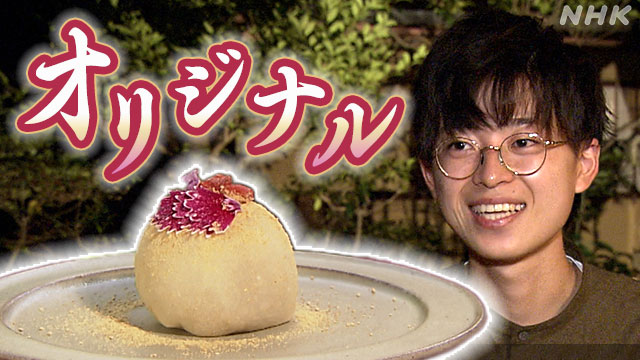A university student who enjoys making Japanese sweets as a hobby and holds a tea ceremony every month.
"I want to express my gratitude to the people who have taken care of me" Ahead of graduation, I put my skills to create "
special Japanese sweets".
(Osaka Broadcasting Station News Reporter Yumi Takano)
In the midst of the Corona disaster
The Japanese confectionery is made by Toshiki Murano, a fourth-year student at Kyoto University.
For the past three years, we have been holding a tea ceremony once a month, inviting close classmates and others.
Toshiki Murano
Mr. Murano:
"I make Japanese sweets with the theme of daily richness and casual everyday happiness."
Mr. Murano started making Japanese sweets three years ago in the spring of his university life, which started with the Corona disaster.
There is no entrance ceremony, and classes are online.
Leaving my hometown of Ehime, I had limited opportunities to meet people.
Murano:
"I felt like I was trapped in a box, like many of my classmates, and I felt very lonely. I was naïve and depressed..."
Self-taught
Originally, Mr. Murano liked to eat Japanese sweets.
"For a change of pace," he began to teach himself how to make original Japanese sweets.
I walked around the city of Kyoto and sketched what I felt was beautiful.
I expanded the image to express it as a confectionery.
Murano's sketch
In between his studies, Murano visits Kishiwada, Osaka, twice a month.
This is to learn how to make Japanese sweets from Yoshihiro Ishida, the owner of a Japanese confectionery shop that has been around for more than 2 years.
Japanese sweets that make you feel happy in your body and mind when you eat them.
I admire Mr. Ishida's attitude, and I have been training with him for about a year.
Training with Mr. Ishida (right)
Yoshihiro Ishida
: "When I look at Murano-kun, I feel that he is making it with pure feelings.
If you eat the Japanese sweets that are being prototyped...
Mr. Ishida: "This is delicious, because when you put your own experience into it, the depth of the confectionery gradually comes out.
I think it's just a matter of asking a lot of people and adding only the good parts."
Through a friend
There is a friend for whom Mr. Murano is particularly grateful.
Yako Fujimori attends the same university.
Conversation Online
There was a time when Mr. Fujimori was reluctant to eat due to stress and anxiety.
However, as for Mr. Murano's Japanese sweets...
Yako
Fujimori: "It's full of thoughts and worldviews, and it contains what I want to convey. You get more than just eating and getting nourishment."
The happiness of eating.
Mr. Murano began to think deeply about the meaning of this through Mr. Fujimori.
Gratitude
And the day of the special tea party.
Under the theme of "gratitude," we welcomed friends, acquaintances, and other people who have taken care of us.
We rented a townhouse in Kyoto as the stage for the "Tea Ceremony of Thanksgiving".
It is known for its beautiful gardens.
We invited about 10 people and served five kinds of Japanese sweets in turn, including daifuku and monaka.
This is a daifuku with the motif of a
stone placed
quietly.
quiet
Mr. Murano: "When I entered university, I was literally trapped in a box in Kyoto in the midst of the coronavirus.
And after the
Corona
disaster, I expressed how my mind and society began to move.
It is decorated with osmanthus flowers.
movement
When I tutored my children, I gave a message to a woman who supported me in some way, and it was called "Mother's Day in Autumn."
It is equipped with the seven autumn herbs of Dianthus and has a hollow inside.
Mother's Day in Autumn
It is a one-of-a-kind Japanese confectionery with gratitude.
Woman
: "It was delicious, Mother's Day... I think it would be so if you were told. Murano-kun is really honest. This Japanese confectionery is the culmination of being loved by various people."
I also told Mr. Fujimori, who I often consulted, "Thank you" through Japanese sweets.
Mr. Fujimori: "It was fun, because I was eating, and I learned a lot of things, and it made me feel every day that I should do my best.
I was inspired by the tea ceremony and I am very grateful for that."
Mr. Murano: "I express what I like in the way I want, and I'm glad that it is an encounter for the people who eat it.
I've had a lot of connections and I've been given this opportunity.
Through Japanese sweets, I hope to convey to everyone the richness of everyday life, happiness, and the margins of life."
Mr. Murano was able to convey his gratitude.
After graduating from university, she plans to work for a company in Tokyo, and she wants to find time to continue making Japanese sweets even after she becomes a member of society.
(Broadcast on November 11 in Kansai)
Happiness News
NHK Osaka is looking for your "happiness news"!

